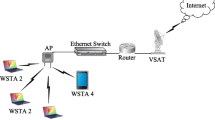Abstract
In IEEE 802.11e Enhanced Distributed Coordinator Function (EDCF) (In the recently approved IEEE 802.11e standard, EDCF is renamed to enhanced distributed channel access (EDCA). Throughout this paper, we use EDCF for consistency with early work in the literature.), per-flow service differentiation is achieved by maintaining separate queues for different traffic categories (TCs). However, due to its static Quality of Service (QoS) parameter setting, EDCF does not perform adequately under high traffic load (Romdhani et al., Proceedings of IEEE wireless communications and networking conference, 2003). We present an extended performance model of EDCF and analyze conditions for network getting overloaded. With this extended model, we show that the overall throughput of a network can be improved by changing the distribution of the number of active stations (an active station is one that has a pending packet to be sent) over a set of TCs. Hence, we propose to dynamically re-allocate flow priorities evenly in order to maintain high system performance while providing QoS guarantee for individual real-time flows. Our scheme has several interesting features: (1) performance of EDCF is improved; (2) low priority flows are not starved under high traffic load; (3) misuse of priority (misuse of priority means that a flow requests much higher priority than necessary) can be easily handled. Simulations are conducted for both infrastructure-based and Ad hoc models. Results show that dynamic priority re-allocation does not decrease throughput of real-time flows under low to medium loads, while considerable improvement over EDCF is obtained even under high loads, making it easy to support multimedia applications.






















Similar content being viewed by others
Explore related subjects
Discover the latest articles and news from researchers in related subjects, suggested using machine learning.Notes
In this paper, we use high priority flows and real-time flows interchangeably.
In this paper, we use low priority flows and best-effort flows interchangeably.
References
Romdhani, L., Ni, Q., & Turletti, T. (2003). Adaptive EDCF: enhanced service differentiation for IEEE 802.11 wireless ad hoc networks. In Proceedings of IEEE wireless communications and networking conference (WCNC’03) (Vol. 2, pp. 1373–1378), New Orleans.
Zhao, J., Zhang, Q., Zhu, W., & Zhang, Y.-Q. (2002). Throughput and QoS optimization in IEEE 802.11 LAN. In International conference on third generation wireless and beyond, San Francisco.
IEEE.802.11e-2005, Institute of Electrical and Electronics Engineers, November 11, 2005 from http://www.techstreet.com/cgi-bin/detail?product_id=1246885.
Lindgren, A., Almquist, A., & Schelén, O. (2001). Evaluation of quality of service schemes for IEEE 802.11 wireless LANs. In Proceedings of the 26th annual IEEE conference on local computer networks (pp. 348–351), Tampa.
Aad, I., Ni, Q., Castelluccia, C., & Turletti, T. (2002). Enhancing IEEE 802.11 performance with slow CW decrease. IEEE 802.11e working group document 802.11-02/674r0.
Chen, W. T., Lin, Y., & Lo, S. (2002). Priority-based contention control in IEEE 802.11 wireless LANs. In 16th international workshop on communications quality & reliability (CQR), Okinawa, Japan.
Vaidya, N. H., Bahl, P., & Gupta, S. (2000). Distributed fair scheduling in wireless LAN. In Proceedings of ACM MOBICOM (pp. 167–178), Boston.
Benveniste, M. (2002). Tiered contention multiple access (TCMA), a QOS-based distributed MAC protocol. In The 13th IEEE international symposium on personal, indoor and mobile radio communications (Vol. 2, pp. 598–604), Lisboa, Portugal.
Aad, I., & Castelluccia, C. (2002). Remarks on per-flow differentiation in IEEE 802.11. In European wireless 2002, Florance, Italy.
Kanodia, V., Li, C., Sabharwal, A., Sadeghi, B., & Knightly, E. (2002). Distributed priority scheduling and medium access in ad hoc networks. ACM Wireless Networks Journal, 8, 455–466.
Yang, X., & Vaidya, N. H. (2002). Priority scheduling in wireless ad hoc networks. In Proceedings of ACM international symposium on mobile ad hoc networking and computing (MobiHoc).
Zhu, H., & Chlamtac, I. (2003). An analytical model for IEEE 802.11e EDCF differential services. In Proceedings of the 12th international conference on computer communications and networks (ICCCN), Dallas.
Li, M., Prabhakaran, B., & Sathyamurthy, S. (2003, September). On flow reservation and admission control for distributed scheduling strategies in IEEE802.11 wireless LAN. In Proceeding of the sixth ACM international workshop on modeling, analysis and simulation of wireless and mobile systems (MSWiM) (pp. 108–115), San Diego.
Acknowledgment
The work is supported in part by US Army Research Office grant 48645-MA and NSF under Grant No. 0237954 for the project CAREER: Animation Databases.
Author information
Authors and Affiliations
Corresponding author
Rights and permissions
About this article
Cite this article
Li, M., Zhu, H. & Prabhakaran, B. Dynamic priority re-allocation scheme for quality of service in IEEE 802.11e wireless networks. Wireless Netw 16, 759–774 (2010). https://doi.org/10.1007/s11276-009-0167-0
Published:
Issue Date:
DOI: https://doi.org/10.1007/s11276-009-0167-0




